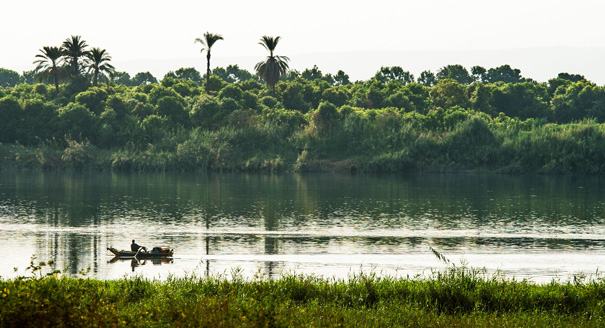When Egyptian technical experts arrived in Ethiopia on October 17 to begin talks with counterparts about the anticipated impact of the Great Ethiopian Renaissance Dam (GERD), they were faced with an unpleasant new fact. Members of the Nile Basin Initiative Council of Ministers—which Egypt is in the process of rejoining after boycotting the group since 2010—had just elected Ethiopian Water Minister Seleshe Bekele to replace his Ugandan counterpart as chair of the group for the next year.
In fact, 2018 is likely to bring to a head tensions between Egypt and Ethiopia over water that have been building for almost a decade. As the GERD nears completion, Ethiopia starts preparations to fill the reservoir, and Sudan develops plans to use more of the river’s flow, the possibility of a water crisis in Egypt is coming into view. Not only would such a crisis add to Egypt’s significant domestic woes—a faltering economy, massive human right abuses, an unpopular president facing re-election—it even opens up the prospect of conflict in the Horn of Africa.
Egypt is one of the most water-poor and water-dependent countries in the world; the Nile supplies nearly all of its fresh water. Egypt’s dependency ratio—that part of the total renewable water resources originating outside the country’s borders—is 97 percent. Some 85 percent of the water that flows into Egypt originally falls as rain in the Ethiopian highlands. Yet as a water-poor country with a rapidly growing population of nearly 100 million, expected to cross the threshold of “absolute water scarcity” by 2030, Egypt has shown little awareness of this in its water-use practices. It uses some 86 percent of its water for agriculture, mostly in antiquated flood (as opposed to drip) irrigation methods, with large losses through evaporation.
Once the GERD, which will be the largest hydroelectric dam in Africa, is completed the Ethiopian government predicts a fill time of 5–6 years, while some Egyptians have argued that a slower fill time of up to 12–18 years is necessary to guarantee their water stability. One study conducted by the Geological Society of America predicts that, with a fill time of 5–7 years, the Nile’s fresh water flow to Egypt could be cut by a shocking 25 percent, slashing not only water available for consumption but also a third of the electricity generated by the Aswan High Dam.
The Egyptian government has not been blind to these impending challenges, although the political instability that the country has experienced since 2011 has almost certainly hindered Cairo’s diplomatic and developmental effectiveness. Successive Egyptian governments under deposed presidents Hosni Mubarak and Mohammed Morsi, as well as under President Abdel Fattah al-Sisi today, have tried during some 15 rounds of diplomacy since 2010 to persuade Ethiopia to abide by a Colonial-era agreement that entitles Egypt to 55.5 billion cubic meters of Nile water annually and Sudan to 18.5 billion. Ethiopia and other upstream nations have consistently questioned the legitimacy of this agreement, to which they were not party and which does not address their water needs. Under the Nile Basin Initiative (NBI), Ethiopia, Rwanda, Tanzania, Uganda, and Burundi all signed a Cooperative Framework Agreement (CFA) in 2010, which aims to “promote integrated management, sustainable development, and harmonious utilization of the water resources of the Basin.” Egypt and Sudan refused to sign the agreement, in part because it permitted upstream countries to build dams and store water. After the signing of the CFA, Egypt froze its membership in the NBI, as well as its technical projects on the Nile. One year later, Ethiopia broke ground on the GERD. Although Egypt, Ethiopia, and Sudan signed a cooperative agreement in 2015, it has not borne much fruit so far.
Egypt suffered a serious diplomatic setback recently when Sudan, the southern neighbor traditionally under Cairo’s sway, switched sides. Sudan has aligned itself with Ethiopia due to an assessment that the GERD could increase its agricultural potential (with the help of extensive investments from Saudi Arabia and the United Arab Emirates, who are eager to enhance their food security), as well as its agreement to purchase electricity from Ethiopia. Egypt has turned to South Sudan as its next partner, with Sisi receiving the South Sudanese president in Cairo. Egypt has also supported the proposed Jonglei Canal Project, which would divert water from South Sudan to Egypt.
At the same time, Egypt has looked internationally for allies to help solve the GERD crisis. In August, for example, Egypt and Germany announced a cooperation agreement and addressed the Nile waters dispute. Germany has continued its €1.7 billion development cooperation with Egypt, focusing on water among several other issues.
But despite some donor attention to Egypt’s increasingly obvious water problem, so far it seems that development projects to improve water usage—the rational solution to this problem—are neither of a proper size nor sharply focused enough to deal with the possible loss of as much as one-quarter of the country’s renewable fresh water. There are wastewater and desalination projects, but most are designed to serve urban or industrial areas, in particular the mega-construction projects in which the Egyptian army specializes such as the new administrative capital to be built east of Cairo. These monuments in the desert not only are massively inefficient in terms of resources such as water, but they divert capital and attention from a more pressing need: updating agricultural practices to save water.
With a significant diminution in Nile flow looming for which Egypt is ill-prepared, there are unconfirmed but troubling reports of a possible resort to security pressure to achieve what diplomacy and development so far have failed to do. Rumors of an Egyptian military base in Eritrea as well as alleged Egyptian support for Ethiopian rebels point to an increasingly tense region. While Cairo has until now relied heavily on diplomacy, it might be preparing more extreme backup options to put pressure on Ethiopia and attract international attention should its efforts fail.






